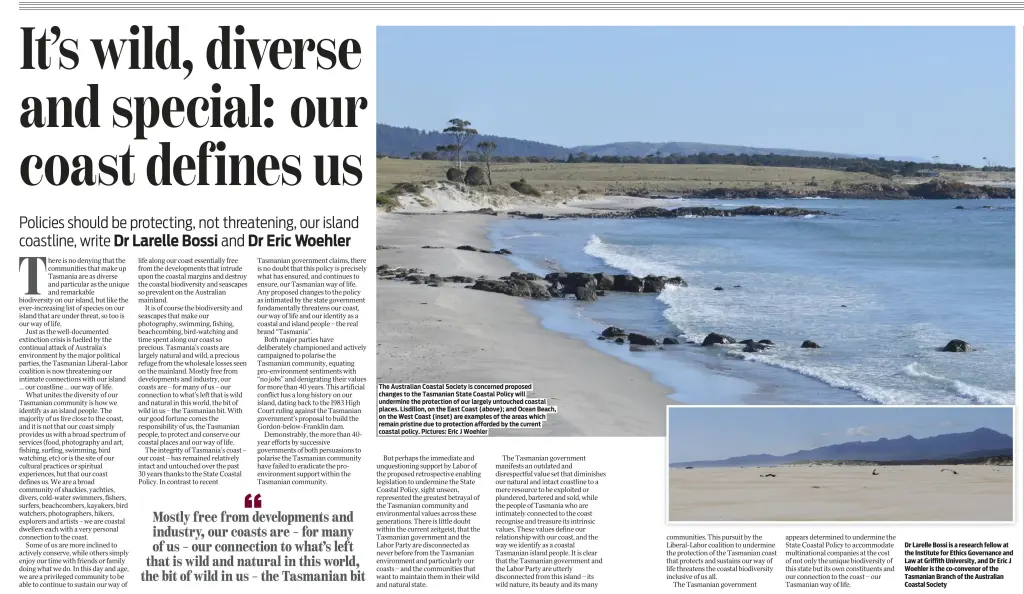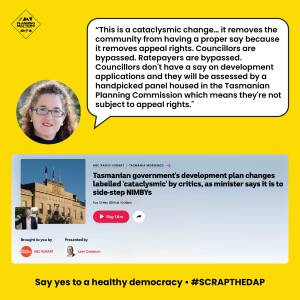- Opinion Piece
Mercury Opinion Piece: It’s wild, diverse & special: our coast’s define us
Media Enquiries
Sophie Underwood
PMAT State Director
sophie_underwood@hotmail.com
0407 501 999
Please share:
Published in The Mercury 15 August 2024.
The Australian Coastal Society is concerned proposed changes to the Tasmanian State Coastal Policy will undermine the protection of our largely untouched coastal places. Lisdillon, on the East Coast (above); and Ocean Beach, on the West Coast (inset) are examples of the areas which remain pristine due to protection afforded by the current coastal policy. Pictures: Eric J Woehler.

Policies should be protecting, not threatening, our island coastline, write Dr Larelle Bossi and Dr Eric Woehler.
There is no denying that the communities that make up Tasmania are as diverse and particular as the unique and remarkable biodiversity on our island, but like the ever-increasing list of species on our island that are under threat, so too is our way of life.
Just as the well-documented extinction crisis is fulled by the continual attack of Australia’s environment by the major political parties, the Tasmanian Liberal- Labor coalition is now threatening our intimate connections with our island… our coastline .. our way of life.
What unties the diversity of our Tasmanian community is how we identify as island people. The majority of us live close to the coast, and it is not that our coast simply provides us with a broad spectrum of services (food, photography and art, fishing, surfing, swimming, bird watching, etc) or is the site of our cultural practices or spiritual experiences, but that our coast defines us. We are a broad community of shackies, yachties, divers, cold-water swimmers, fishers, surfers, beachcombers, kayakers, bird watchers, photographers, hikers, explorers, and artists – we are coastal dwellers each with a very personal connection to the coast.
Some of us are more inclined to actively conserve, while others simply enjoy our time with friends or family doing what we do. In this day and age, we are privileged community to be able to continue to sustain our way of life along our coast essentially free from the developments that intrude upon the coastal margins and destroy the coastal biodiversity and seascapes so prevalent on the Australian mainland.
It is of course the biodiversity and seascapes that make our photography, swimming, fishing, beachcombing, bird-watching and time spent along our coast so precious. Tasmania’s coasts are largely natural and wild, a precious refuge from the wholesale losses seen on the mainland. Mostly free from developments and industry, our coasts are – for many of us – our connection to what’s left that is wild and natural in this world, the of wild in us – the Tasmanian bit. With our good fortune comes the responsibility of us, the Tasmanian people, to protect and conserve our coastal places and our way of life.
The integrity of Tasmania’s coast – our coast – has remained relatively intact and untouched over the past 30 years thanks to the State Coastal Policy. In contrast to recent Tasmanian Government claims, there is no doubt that this policy is precisely what has ensured, and continues to ensure, our Tasmanian way of life. Any proposed changes to the policy as intimated by the state government fundamentally threatens our coast, our way of life and our identity as a coastal and island people – the real brand “Tasmania”.
Mostly free from developments and industry, our coasts are - for many of us - our connection to what's left that is wild and natural in this world, the bit of wild in us - the Tasmanian bit

Both major parties have deliberately championed and actively campaigned to polarise the Tasmanian community, equating pro-environment sentiments with “no jobs” and denigrating their values for more than 40 years. This artificial conflict has a long history on our island, dating back to 1983 High Court ruling against the Tasmanian government’s proposal to build the Gordon-below-Franklin dam.
Demonstrably, the more than 40-year efforts by successive governments of both persuasions to polarise the Tasmanian community have failed to eradicate the pro-environment support within the Tasmanian community.
But perhaps the immediate and unquestioning support by Labor of the proposed retrospective enabling legislation to undermine the State Coastal Policy, sight unseen, represented the greatest betrayal of the Tasmanian community and environmental values across these generations. There is little doubt within the current zeitgeist, that the Tasmanian government and the Labor Party are disconnected as never before from the Tasmanian environment and particularly our coasts – and the communities that want to maintain them in their wild and natural state.
The Tasmanian government manifests an outdated and disrespectful value set that diminishes our natural and intact coastline to a mere resource to be exploited or plundered, bartered and sold, while the people of Tasmania who are intimately connected to the coast recognise and treasure its intrinsic values. These values define our relationship with our coast, and the way we identify as a coastal Tasmanian island people. It is clear that the Tasmanian Government and the Labor Party are utterly disconnected from this island – its wild nature, its beauty and it many communities. This pursuit by the Liberal-Labor coalition to undermine the protection of the Tasmanian coast that protects and sustains our way of life threatens the coastal biodiversity inclusive of us all.
The Tasmanian government appears determine to undermine the State Coastal Policy to accommodate multinational companies at the cost of not only the unique biodiversity of this state but its own constituents and our connection to the coast – our Tasmanian way of life.
Dr Larelle Bossi is a research fellow at the Institute for Ethics Governance and Law at Griffith University, and Dr Eric J Woehler is the c0-convenor of the Tasmanian Branch of the Australian Coastal Society.
Related News & Media

Mercury Opinion Piece: Minister’s planning reforms a thinly veiled attempt to centralise power and bypass local councils
Tasmania cannot risk development at any cost, writes Brendan Blomeley.

Pulse Opinion Piece:‘Self-interest’ accusations fly as greater Hobart mayors oppose new planning powers
“The mayors of greater Hobart have been accused of acting in their own “self-interest” after coming out against plans that could see them stripped of

Mercury Opinion Piece: Lessons to learn blurring lines of private and public
Felix Ellis’s Bill to remove individual planning decisions from local [Tasmanian] government is a real worry, writes Peter Boyer.

ABC Interview: Tasmanian government’s development plan changes labelled ‘cataclysmic’ by critics, as minister says it is to side-step NIMBYs
Listen to PMAT’s State Director Sophie Underwood, and Clarence Mayor Brendan Blomeley on ABC Mornings speaking about why Development Assessment Panels (DAPs) are terrible for
Receive News & Updates from PMAT
Stay informed on what’s happening locally and statewide within Tasmania, and join our community in advocating to protect Tasmania’s future.